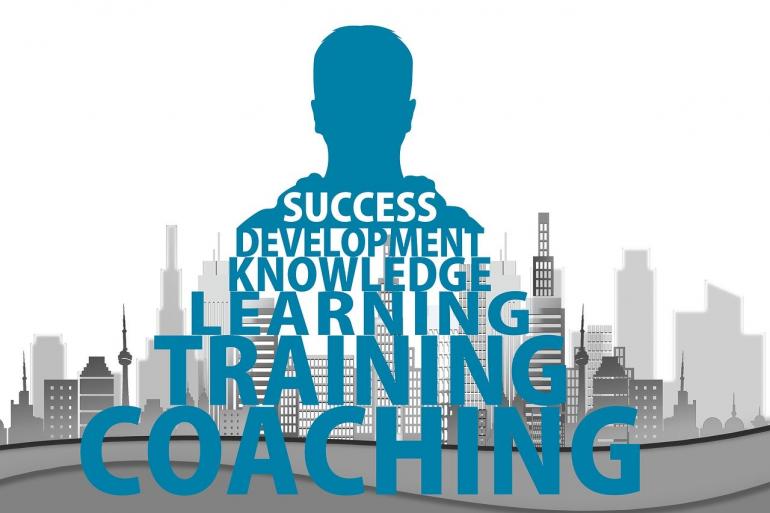
4 Steps to Success
I’ve developed four steps to success in the quest for personal development.
1. Good Ideas
Ideas are the life seeds of enterprise. A better life comes by the search for good ideas. Never cease your quest for knowledge. Finding ideas can be life changing. Business ideas, social ideas, personal ideas—nothing is as powerful as an idea whose time has come. Be a searcher of good ideas: timely ideas, political ideas, family ideas, healthy ideas. Then, do what I do: Keep a journal. Keep a log of good ideas. That’s for the serious students. I used to take notes on pieces of paper and found out I couldn’t go through them, couldn’t catalog them, and I missed a lot of good stuff. So I learned to keep good ideas in a journal. It’s an extension of your learning library.
2. Good Plans
Be a student of good plans. Plans are important because they give birth to ideas. Plans take ideas to the marketplace. Plans well executed bring ideas into the better life. Ideas without plans forever hang like an artist’s rendering on the wall. They never become reality. They never become substance. So be a student of good plans. Develop good, disciplined plans. Riches do not come by crossing your fingers and walking through the day hoping. Riches and wealth come from well-laid plans.
3. The Passing of Time
All of us have to learn to handle time. It’s one of the challenges of life, learning to wait. Part of success is patience—the passing of time. It takes time to build a career. It takes time to make changes. It takes time to learn, grow, change, develop and produce. It takes time to refine philosophy and activity. So give yourself time to learn, time to start some momentum, time to finally achieve.
4. Solving Problems
Success is simply solving problems. There are all kinds of problems: business problems, family problems, personal problems, financial problems, emotional problems. Everybody’s got a list of problems. Problem-solving is where enterprise comes from. It’s how you build worth and wealth.
I once met Neil Armstrong, the first man on the moon. He put it fairly simply. He said going to the moon and back was merely a matter of solving problems. Problem 1: how to get there. Problem 2: how to get back. That’s simple, right? He said make sure you don’t leave until you’ve solved both problems. Well put. Sure, some things are complicated, but if you take it one piece at a time—solve the problems, put it back together—you can’t believe the enterprise you can build, the life you can build, the skills you can build. Take it a piece at a time, master it, and then put it back together to solve it.
Put It on Paper
Learn to solve problems on paper. You’ve got to commit some of your thoughts to paper. If you just deal out of your head all the time, it’s too easy to make errors. So take a piece of paper and just spend a little time outlining the problem. Instead of just thinking about it, take what’s in your head, put it on paper and work it out. It helps you to focus. It helps you to zero in.
Now, when you state the problem to the best of your ability, you just add this one question: Is that all of it? You say, well, we’re not to dwell on problems. No, we’re not to dwell on them or live in them, but at least you have got to state them. Because you can’t solve them until you clearly define them.
3 Simple Questions
The answer to solving problems falls into three simple questions.
1. What can I do?
What can I do to solve the problem? What can I do? This is when you start developing what we call working papers. You say, well, here’s potential answer number one. That’s an answer. Potential answer number two is a possibility. And number three, that’s a possibility. You just start laying out possible solutions. Then you go back and analyze these solutions. Number three? You’ve already come to the conclusion it would take too long. OK, number two? Too big a question mark. Number one is probably it. Your first inclination was right. Study that a little more and see if that’s it.
2. What can I read?
The first step to solving problems is to write them down. The second step is to develop working papers on possible solutions. If that doesn’t do it, here is the second question to ask: What can I read? Maybe there’s a book on your problem. Somebody may have spent a lifetime trying to figure out this problem. You could receive the instant benefit of this person’s advice if you take the time to look. Maybe it’s concisely written somewhere. You don’t need to reinvent the wheel. If you do your homework, you just may find the solution.
3. Who can I ask?
If that still doesn’t work, here’s the third question: Who can I ask? Now, don’t hesitate to ask, but let me give you a clue: Don’t ask first. If you always just ask, you won’t develop the skills you need for solving problems. What’s more valuable than the solution to a problem? The skills of solving problems. The answer to a problem is temporary, while problem-solving skills are permanent. So it’s not just answers we need, it’s skills we need. But if you’ve tried your best to figure it out yourself and you’re still falling short, have your notes ready when you ask for help. You can’t believe how willing people will be to help you if they know you’re willing to help yourself.
5 Skills That Create Success in the Marketplace
Learn to concentrate on these five abilities in your personal development quest. They will help you skillfully attack the marketplace.
1. Absorb
Develop the ability to absorb, the ability to soak in, take in, be like a sponge. Sitting in class or at the workplace, sometimes it’s easy to daydream, to be preoccupied, to be somewhere else.
I read a good article once in Reader’s Digest. The title was, “Wherever You Are, Be There.” I thought that was excellent. Be there. Concentration. It’s also important in learning extra skills to really pay attention. Absorb, take in.
Most people are trying to get through the day. I’ve got a better objective for you: Learn to get from the day. Not just get through it; get from it. Soak it up. Each day is a piece of the mosaic of your life. Don’t waste any. Treat it with care. See how much you can get from a day—how much advice, how much information, how much color, how much sight and sound to add to your worth and your wealth and your equity of mind.
2. Respond
Develop the skill to respond, the ability to be affected by what you see and hear and sense. Success is not just knowledge. Success is response to knowledge. Success is not just experience. Success is emotion created from experience. It’s the emotional part that plays such a major part in our life and our future and our success.
Responding to life means to let sad things make you sad, to let happy things make you happy, to let puzzling things puzzle you. Let things that are difficult create difficulty for you. Respond.
I’m asking you to let it affect you, let it do things to you. This builds your emotional bank.
3. Reflect
Learn to reflect. Reflecting is an extra way of getting more value from what you know and what you’ve been through. Reflecting is going back over.
Take just a few minutes at the end of the day, find a place, if you can, to be alone, and just go back and think through the day. Where have you been? What did you see? What did you hear? What did you feel? If you’ll just relive it, I’m telling you, it will add multiplied value to you. The day you’ve just been through will be more valuable for your future if you just go back through it.
Take a few hours at the end of the week and minutes at the end of the day, half a day at the end of the month and a weekend at the end of the year. Those are called times to reflect. Now, why go back over? Let me tell you why: to make the past more valuable. If you’ll take the time to review what’s going on, review the decision-making, review the people you’re with, review the actions you’re taking, the decisions you’re making, review all that stuff, go back through the feeling, you will make your life more valuable.
Now, why try to make your life valuable? Simple answer: to invest it in the future. We call that bright. We call that skillful, to make more out of your past, to have more value to invest in the future, instead of just trying to get through one more day, trying to get through one more week. It’s to get more out of your past and invest it in your future.
4. Act
Develop the ability to act, the ability to take action on your feelings and your knowledge. Disciplined action is what gives birth to ideas, enterprise and values. Without activity, ideas and dreams have no life.
Disciplined activity is the most demanding of arts to take you where you want to go. Now, sometimes it doesn’t take much of a change of activity. Daily or weekly disciplines are those small changes of intelligent activity that take you in a better direction. Here’s a good way to look at it: Ten years from now, you will surely arrive. The question is, where? Now is the time to fix the next 10 years. Fix a better course.
Now, to unsophisticated people, what they do during the day doesn’t seem to matter. But to sophisticated people, it makes all the difference in the world. The books you read, the actions you take, the disciplines you engage in on a daily basis, those are the activities that are taking you somewhere, and all of us need to take a look at where our daily activities are taking us. The activity of learning, the activity of mind, health disciplines, wealth disciplines, culture disciplines—all values come from disciplines. Ideas put into disciplined activity create value.
5. Share
Sharing is a unique human capacity. Sharing is a phenomenon, especially in the human experience. It seems when we share, we are the bigger and better for it.
It seems like if you share something and give it away, you’d have less. But it’s a paradox. What you share creates more for you. That’s why we call it a paradox. You’re not diminished by sharing. You’re increased.
If you have a child and you love him dearly, and if a second child comes along, must you now cut your love in half? The answer is no. From some strange, mysterious source comes an increased capacity. From sharing with the first, capacity and an awareness and uniqueness are increased. So that is what I would ask you to do, become gifted in sharing.
There are many ways to share. One is by the gift of language. One of the most important studies for you is the study of communication, how to affect other people with words.
Sharing With Good Communication
Have something good to say. You can’t speak what you don’t know. Talking is like writing a check. You want to make sure you’ve got a verbal check that will cash when you get ready to talk. And here’s the true power of communication: What you say is only the tip of the iceberg of what you know. I’m sure we’ve all been around people who quickly told us more than they knew. Do your homework. Have something good to share. Have something good to say.
Here are some steps toward sharing with good communication.
Say it well.
Part of the gift of language is saying it uniquely. Winston Churchill had the unique ability to take the English language and send it into battle. The words he composed and the speeches he gave and the language and style gave such hope to the free world that soon the enemy was defeated. But part of it was the structure of the language, the skill, the gift of saying things well.
Read your audience.
When you talk, you’ve just got to be interested enough to look and see how you’re doing. Learn to read your audience. I had to learn that. At first, I was so absorbed in what I was saying that I’m sure the audience could have left and I would have never known it. But I finally learned to look up to see what’s going on here, over here, in the back. That was an experience for me, learning to read, to see, to study the reflection of whomever you’re communicating with. That’s an art, a skill.
Say it with intensity.
Words with strong feeling behind them change the meaning. Words can have power if they’re loaded with emotion and belief, courage, love, understanding, awareness, sympathy, concern, being touched by somebody. If you put more of that into what you say, it’ll have an incredible effect.
So share your knowledge. You can’t believe how well you can help somebody just by recommending a book. Recommend a poem. Share a word, a phrase. You say, “Hey, I just read this, and I think you’ll get a lot out of it.” Somebody reads it and comes back and says, “Hey, that had an impact on my life, and I’m glad you shared that with me.” Then you start getting compliments.
It’s an incredible feeling when people tell you, “What you said made a difference for me.” But you don’t have to lecture in front of thousands of people to get that same feedback. All you have to do is recommend a book or share an idea. Somebody comes back and says, “That book got me started,” or, “The things you told me at breakfast that morning, wow, I’ve been thinking about that and I’m making some changes.” You can experience this incredible pleasure that comes from sharing ideas.
Remember, what you pour out creates a capacity for more. So pour out what you know. Pour out what you feel. Let go in a sharing way the good things that have come your way. That’s a major part of the skill in the marketplace of developing success, wealth and value.
The Person You Wish to Become
So, develop skills that make you attractive to the marketplace. Develop the temperament and the attitude that make you attractive to the business world, the attitude and the temperament that make you a splendid husband, wife, father, mother, son, daughter, friend, co-worker, business partner. Because, here’s what’s important: It’s not what you get that makes you valuable, it’s what you become that makes you valuable.
One last phrase to consider in the quest for personal development: Promise is on the other side of price. For the promise, you must always pay the price. If you want the glory of success, the glory of a unique family, the glory and the recognition of a unique enterprise, the glory of a job well done, then you’ve got to pay up front. And the discipline of developing skills for the marketplace is part of the pay. But once you get a taste of value, you don’t mind paying the discipline. I wish for you all these good things that come from paying the price.
A note on this guide: The text of this guide is based on the transcripts of Jim Rohn’s most popular lectures and writings on the subject of personal development. His original words have been transcribed, edited, rearranged and slightly modified in some instances for greater clarity. As you read, you may recognize a familiar pace to the text. It is our hope that Jim’s easy conversational tone and speaking style come across as you read the life philosophies and success principles that are as relevant today as they were when he first expressed them.
About Jim Rohn: For more than 40 years, Jim Rohn honed his craft like a skilled artist, helping people all over the world sculpt life strategies that expanded their imagination of what is possible. Jim set the standard for those who seek to teach and inspire others. He possessed the unique ability to bring extraordinary insights to ordinary principles and events. Those who had the privilege of hearing him speak can attest to the elegance and common sense in his material. It is no coincidence, then, that he is widely regarded as one of the most influential thinkers of our time and a national treasure. Jim authored numerous books and audio and video programs, and he helped motivate and shape an entire generation of personal development trainers and hundreds of executives from America’s top corporations.



